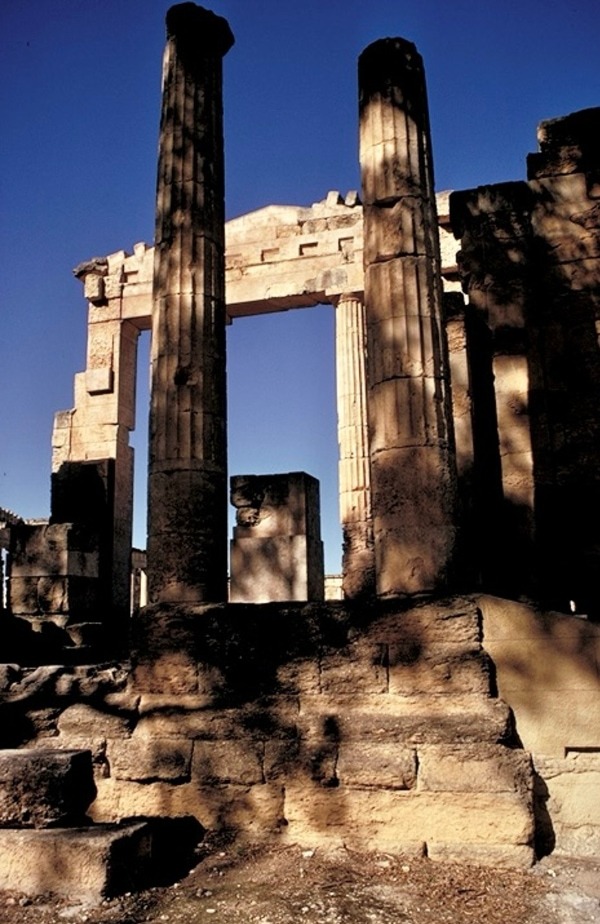From My Notebooks In 1973: Out of Libya?
16th November 2025 |
We left our hero (that’s me) stewing in Benghazi, hoping to get help. My visa forbids me to enter Egypt overland. Egypt is at war with Israel. After waiting uselessly for some news from the Sunday Times, my sponsor, I decide I might as well try anyway. Meanwhile I know that between Benghazi and the frontier are famous Roman ruins, not to be missed. These are the notes exactly as I wrote them.
November 5th, leaving Benghazi for the frontier
Kerim’s counsel – visit Cyrene and Appolonius on the way back.
Egyptian consul: “It is absolutely impossible for you to go through to Cairo.” Everybody else more or less emphatically agrees, although when they see I’m determined they say “maybe since you’re journalist”, and so on.
For myself I treat my visit to the frontier as an excursion and set out convinced that I shall return in four or five days to collect the papers now on their way from London, and to put myself and my bike on the plane to Cairo for about $60. I have found this cheaper than road transport for the bike (lowest quote £53) and although a boat would be cheaper there is none till the 20th – in two weeks’ time.
So off to Derna at 2pm. Lose my way slightly and detour by airport, emerging onto main road where the police checkpoint has massive queue of travellers in taxis. But I slip past unnoticed. Travelling East the fez gives way to turban, the women’s white cloak to the check pattern blue and red. Road good but uneventful. Even Michelin green bit is only an average road in the hills of Provence, but rising inland the air becomes quite cold. (although only 1000ft up, at most) and land much richer in vegetation and farming. Building projects, new houses the ‘new town’ with the mosque and grain silo
Realise I must have missed Derna road – and now on the road to El Beida, which means taking the antiquities in now rather than on the way back. But first nightfall intervenes. Find shallow dip between scrub wooded hills, where patch of grass has been cleared and levelled for my particular use by an ally.
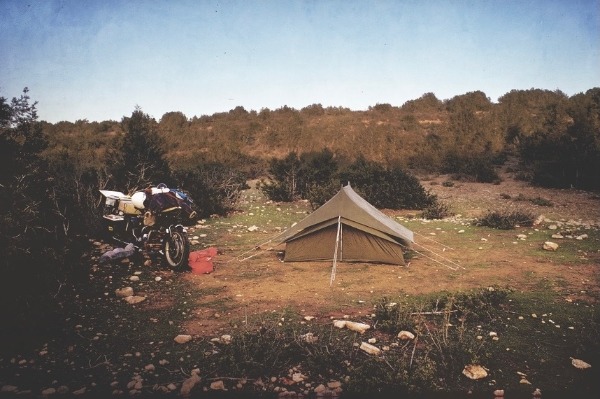
Set up tent. Build fire. Cook Bulgarian mixed veg and peppers with corned beef. Coffee. Very good. Use battery/recorder device. Works well. 8.30 pm. No more distractions. Go to bed. Hear distant male voice, wandering past, coming to me from all directions, talking to dog, which yelps obediently. Can’t help a mounting sense of anxiety. And when the voice breaks into a lusty song I scramble into my trousers, shirt, sweater, jacket, boots and light a cigarette, and advance to confront the enemy. Amazed to find a flock of about fifty sheep gathered by roadside, (hundred yards away). In the middle, two cloaked, turbaned figures; Bright moon gives their clothes a rich appearance. (Next day I see it is only sacking.) We exchange greetings – try to converse but fail. I return to tent and sleep calmly, like one of their sheep. Awake to find them gathered about me. Gazing at the paraphernalia assembled (and am now packing) to pass a night which they endured with such simplicity.
[Although I am not religious, I was aware that this part of the world, called Cyrenaica, had an important part to play in the bible story, and I was powerfully affected by the biblical imagery conjured up in moonlight by noble-seeming shepherds in shining raiment ”watching their flocks by night.” Even more so next morning when, without the trick of moonlight their “raiment” was reduced to sackcloth, their turbans to rags, and they to poor, shivering peasants.]
It is freezing. Dew turned to ice. Fingers numb. Tent soaking wet. Pack and leave.
To Shahat, which is Cyrene. Ruins. Pictures.
[I was totally unprepared for what I found. A huge city of Roman ruins, totally deserted but for one Englishman, a French commercial traveller, and a minimal hotel staff.]

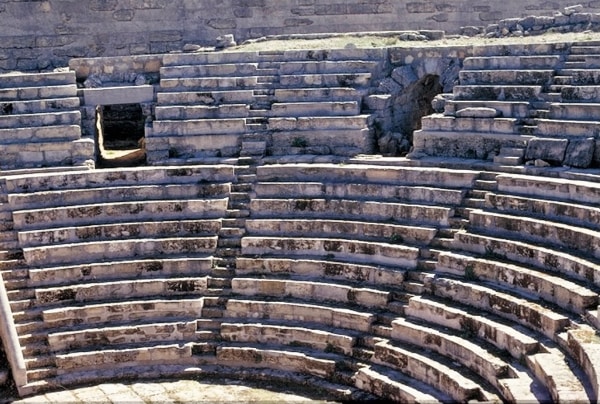
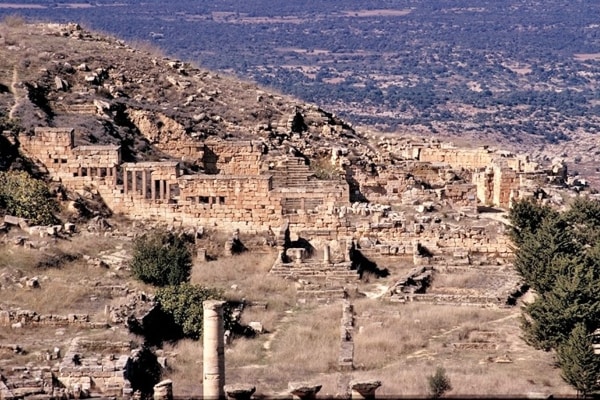
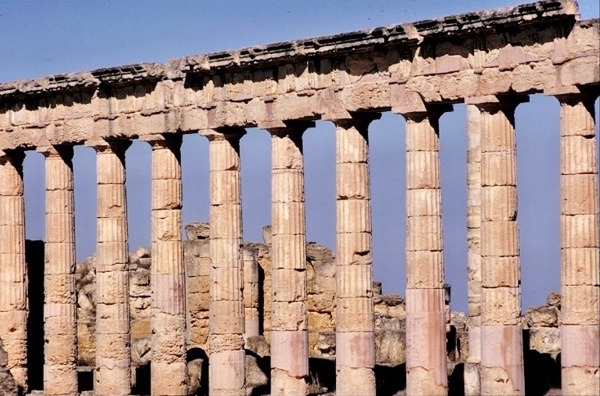
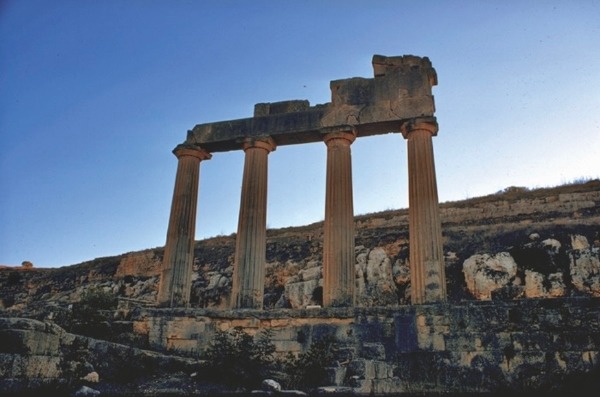
Frenchman at Tourist Hotel. Again, that curious French logic which somehow devalues the Arab quality while paying lip service to it. But good company.
(Jacques Puistienne, African Sales Director, Rhone-Poulenc-Textile, 5 Avenue Percier, 75. Paris 8e. 256 75 75)
Also, English ex-soldier, now wireless/radar installation engineer, living in chalet at hotel. Plastic on horns [???] British bring in brew-it-yourself beer. Says Libyans can’t cope with their technology. Mental age of fourteen.
Party of [Libyan] Air Force bigwigs arrive on guided tour accompanied by Air Force photographer with flash. Very American. After lunch they sweep in and out of Cyrene in ten minutes.
Englishman: “Border is military zone. Itchy trigger fingers. They shoot first then ask. One more Sunday Times man gone.”
All the world loves a lurid tale.
[I leave in the afternoon for Tobruk]
On past Apollonius, and the rugged coast road (the old Italian road) where again the sun catches me. Tent. Mosquitoes this time. Net works well – one bite. Stay up longer this time. Night warm. Sleep well. Morning dry. No condensation. Leave at 8 am. Derna. Tobruk. Hot sun. Meet Noel Moloney in road. Teaches at Oil (‘Isle’) Institute. Invited to tea. Stay for lunch. Wine. Wife Italian. Giuseppina. She hates Arabs. He says they’re childish. Earns £500 a month. 60% take abroad. Buying flat in Ancona. Another in Rome, and farmhouse in Ireland. Says the Libyans regard foreigners as “exploiters.” Has little affection for them. Remarks that after a while the students and staff at institute seem to have fondness for him.
Small children can’t play with Arabs because of skin diseases. [says the wife]
I become increasingly impressed by the difference between my experiences and those of other Europeans. “It wouldn’t be so bad if they didn’t treat us like Martians in the street.” Says Libyans under-use him. Works less than six months in the year (but paid full time.)
They invite me to sleep on my way back. [I am totally convinced they won’t let me into Egypt.]
At 3pm I set off for the frontier. 75 miles. 65 minutes. Convinced I can’t hope to pass but can’t resist the fantasy that I might. Arrive before sunset at Libyan police post. They take my currency exchange form. Why? They show no surprise at my passport. Obviously, they are indulging me in my little escapade. I humour their indulgence. I drive on, waiting for the man who says “No.” Have rehearsed all sorts of speeches about the meaning of war, the importance of adventure, the Arab cause, etc. Come to row of mobile site offices and barricade. More Libyans, but this time they stamp my passport. Now it’s serious because I’m not 100% sure that when Egypt sends me back, Libya will take me. Ridiculous. They wave me through. What, all the way? Yes. I drive into the main customs area, and with delightful innocence plough past the massed taxis, turbans, and mountains of carpet in plastic bags. Eventually I’m hauled back to the “Captain” who presides at a desk on a rostrum.
There, a roly-poly man, unshaven, moustache, takes me personally under his wing. Jumps all queues, gives me a glass of tea. Then:
(1) Man reads my UAR visa, several times looks at “No Entry” qualification. “Access to the UAR via the coast of N.Africa and Salloum is not permitted.” But seems to see nothing there of interest. Takes me to –
(2) Where, with a semi-literate they fill in a Roneo’d form. Great problem with XRW964M. Then give me the paper. I stuff it in with the carnet. Then –
(3) And (4) is another flurry of papers, given and exchanged. I no longer have any idea which are Egyptian, which Libyan, but keeping track is full time as Roly-poly beckons me on. At one point I lose sight of the first paper, something to do with police. “Is it important,” asks Roly-poly. “It isn’t. Never mind.” I give way, knowing I shouldn’t. Change money at (5), pay for licensing bike at (6). Back to (3) for argument about carnet. Then at (7) Libyans discharge it. to (8) where a police officer behind a row of ledgers so thumbed as to be eroded like old stone bannisters, says he’ll give me three months and hands me two heavy steel number plates. Bemused, I totter off with my load.
“That’s all,” says Roly-Poly. “Now, can I help you in any other way?” I don’t know what to do. Fumble towards my pocket, then decide against it. He looks corrupt, but that’s as likely to be my prejudice. Why assume it? He seems happy enough when I thank him and turn away.
Earlier, he asked, urgently, “Did you thank him?” referring to the captain. Puzzled, I replied “I always thank everyone.” He laughs loudly, but I’m no wiser. Did he mean bribe, reward? Meanwhile I’ve found that first cryptic form again, and stuff it away with all the others. There is no room for passport and wallet in the tank bag. I lay them over big gloves in the rt-hand pannier. Lock up and leave. The impossible has happened. I’m in Egypt.
Next week: The rocky road to Alexandria.
